Two million people own horses, according to the American Horse Council. And probably 1,999,999 of them will do — and spend — what it takes to live their passion and ensure their horses’ well being.
“You can go to a horse farm and walk into the barn and eat off of the floor,” says Kelly Tabor, manager for GreenSouth Equipment, a John Deere dealership in Ocala, Fla.
Steve Andersen, founder of Equine Savings, says horse owners offer lots of selling opportunities for dealers. His company works with manufacturers and dealers to offer discounts to horse owners. He estimates that those who own several horses make up about 85% of the market.
“For most folks, they have another job and this is their passion. Horses are their family, their babies. And everyone wants their place to look good,” Andersen says.
Rural lifestyle dealers have the equipment they need to maintain their lifestyle. Offer them expertise, too, and you can earn a long-time customer. Consider these strategies for serving horse owners, whether you’re smack dab in the middle of horse country or serve the occasional drop-in horse lover.
Ask Questions
GreenSouth is definitely a dealer in horse country. Ocala is one of five cities to be designated as the horse capital of the world.
Get Horse Smart
These resources can help you learn more about horse ownership.
- Horsequest Community of Practice (Cooperative Extension Systems) — Look for articles on facilities, exercise and performance, feeds and more
- American Horse Council — Learn about industry statistics, legislative issues and more, http://www.horsecouncil.org
- Newsletters and more from national horse organizations, including the National Thoroughbred Racing Assn., American Quarter Horse Assn. and American Saddlebred Horse Assn.
“We have thousands of horse farms in the area, from big commercial farms to independent farms to those with 12 horses,” says Tabor.
Tabor says it’s important to assume the role of adviser when dealing with horse owners.
“You need to spend extra time and extra care because they are absolutely at your mercy,” he says, referring to their level of equipment knowledge.
Dealers in Kentucky horse country agree.
“A lot of them don’t know what they need. They come off of a subdivision and have bought several acres and don’t know the capabilities of the equipment,” says Scott LeCompte, general manager of Jacobi Sales’ Shelbyville, Ky., location. Shelbyville is in Shelby County, the Saddlebred capital of the world. The Case IH dealer has seven locations in Kentucky and Indiana.
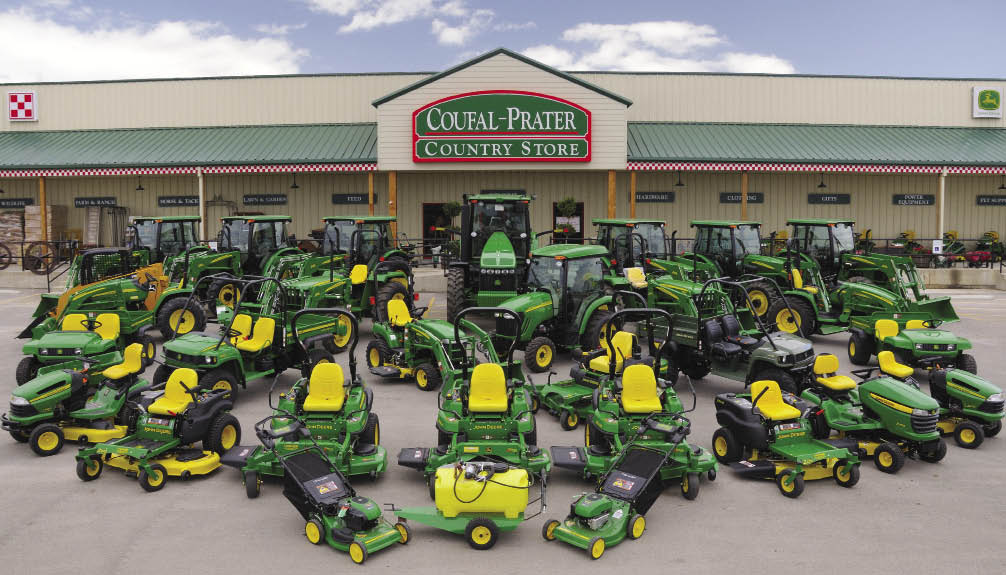
Coufal-Prater of Navasoto, Texas, sells feed, horse supplies, tack and more at its Country Store. The store and its WW Manufacturing fencing helps the dealership earn follow-on equipment sales.
Before even discussing equipment, find out the “who” and “how” of the rural lifestyle operation.
“The biggest mistake is the assumption that you’re going to talk to the man, but if you ignore the wife, they’ll go somewhere else,” says Tabor.
Paul Huber, owner of Central Equipment, a John Deere and Kubota dealer in Lexington, Ky., estimates that 80% of the small horse farms in his area are operated by women.
“If a couple comes in, I ask ‘Who’s going to be operating the tractor?’ Eighty percent of the time it’s the wife,” says Huber.
Equipment that is easy to operate or that makes a manual job easier could be the deciding factor. Continue the discussion with how the customer, man or woman, views the job.
“For some, mowing is not a job to get done but something they enjoy doing. Some say ‘I don’t want to be mowing all day,’ ” Huber says. His dealership sells Exmark and several other brands of mowers.
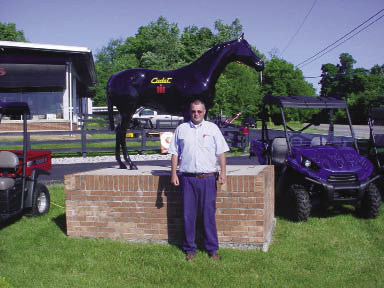
Scott LeCompte, general manager of Jacobi Sales’ Shelbyville location, says the dealership’s life-size horse helps show they understand the needs of horse owners.
And, of course, ask about their horses. Customers who ride horses for competition may have different equipment needs than those who trail ride.
Save Time on Major Jobs
Horse owners have lots of jobs. Dealers say the big time-killers are mowing and manure handling.
“Mowing equipment is big here because horse farms are kept very nice,” says LeCompte.
Dealers have the chance to sell zero-turn or other riding mowers for the grounds near the house or barn and three-point rotary cutters for rough pastures and paddocks.
“For horses in pasture, the owners have to keep that mowed in June, July and August especially. With rain and moisture, the horses could get fungus on their hooves, which can lead to problems and vet bills,” says Tabor.
Huber offers his customers an option if they don’t want to purchase separate mowers. He says he sometimes adds seat suspension kits to riding mowers for a more comfortable ride on uneven ground.
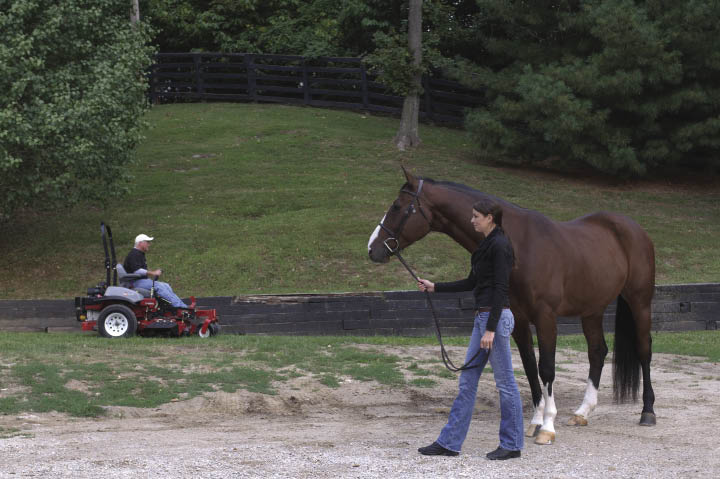
Dealers say horse owners take pride in well-kept grounds.
Dealers say it’s important to equate mowing with time, but to be careful not to oversize the machine.
Huber uses this formula when sizing a tractor:
Miles per hour (5 miles for tractor or 7 miles for a zero-turn mower) X mower width of the cut in inches / 120 = number of acres mowed per hour.
Dealer knowledge can also help streamline the other major chore, manure handling. Dealers say horse owners clean stalls frequently, often daily. Discuss their capabilities for manure disposal to ensure horse health.
Owners with 10 or 12 acres and several horses, for example, don’t have enough acreage to spread manure without risking parasites, says Huber. They’ll have a “muck pile” instead. Others will be able to spread manure over fields. And, others may turn to disposal services.
Based on the operation, dealers can offer options for tractors with front-end loaders and buckets and a manure spreader attachment with a capacity of 50-60 bushels. Or, many horse owners rely on utility vehicles with a hydraulic dump or cart.
As with other rural lifestylers, utility vehicles are very popular.
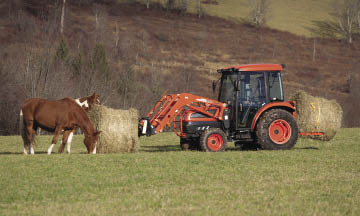
Horse owners often require attachments for feeding and stall and grounds maintenance. Ask the right questions to identify how they want to handle these chores.
“Some want the units that have an extra seat so they can move people back and forth. And, some want smaller versions just to haul around a couple bales of hay or buckets of feed,” says LeCompte.
Demand for Attachments
Tractor attachments — pallet forks, bale spears, carts for hauling grain buckets and more — are the name of the game for feeding and arena maintenance.
Consider suggesting a bale unroller for some applications. Huber says some horse owners in his area are finding it more cost-efficient to buy round bales and unroll and use what they need.
If the owner rides in an arena, they’ll need grooming equipment.
Number of Horses by State*
- Texas — 978,822
- California — 698,345
- Florida — 500,124
- Oklahoma — 326,134
- Kentucky — 320,173
- Ohio — 306,898
- Missouri — 281,255
- North Carolina — 256,269
- Pennsylvania — 255,763
- Colorado — 255,503
*American Horse Council’s latest survey, 2005
"Harrows break up the manure and allow the sun to kill the parasites,” says Huber, who sells Woods Equipment attachments.
Owners, who need a finely prepared arena for competition training, may need arena rakes and spin groomers.
Regional and seasonal challenges offer other ways to serve horse owners.
“With the price of feed ever rising, horse owners have started growing their own hay and alfalfa, plus mixing their own ingredients for feeding,” says Alan Rivera, vice president of Rivera’s Machinery/Hill Country Tractor, a Kioti dealership in Donna and San Antonio, Texas. “We’re seeing a lot of people coming in and saying ‘I need to feed horses and cattle. I need to buy a hay baler or I need a grinder/mixer to grind up hay.’ ”
Rivera advises horse owners to get smaller balers than they would to feed cattle. He says horses are picky, tending to eat only the outside. A smaller bale means less waste.
Follow-On Sales
Fencing, feed, and tack offer horse owners more selling opportunities. Jeff Weston says fencing is a key purchase. Weston is based at Coufal-Prater’s Navasota, Texas, location, about 80 miles from Houston. Coufal-Prater is a John Deere dealership with five locations in Texas. Again, dealers can earn a sale by using their knowledge.
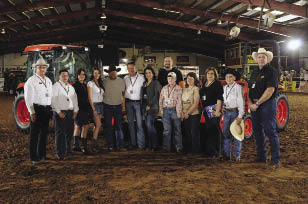
Alan Rivera (center, white shirt), of Rivera’s Machinery/Hill Country Tractor, sponsors the George Strait Team Roping Classic to build the dealership’s reputation among horse owners.
“We’re starting to see many people who haven’t owned livestock. They just don’t know how a gate should swing or about putting a horse in a good solid stall,” Weston says.
He says safety is a top concern when he’s dealing with rural lifestylers because they may not be around their horses as much as ranchers. He advises customers to take their time and think through their fencing system for larger areas.
“I get nervous when they come in and say ‘How much is that pen? Great. I’ll take it.’ ”
Instead, Weston prefers to talk about the acreage and the kind of horses and then draw a design.
Weston says many of his customers come in for fencing first and then learn about the dealership’s equipment and its Country Store, where they sell feed, tack, ropes, saddles, accessories and clothing.
Number of Horses by Activity*
- Racing .......... 844,531
- Showing .......... 2,718,954
- Recreation .......... 3,906,923
- Other .......... 1,752,439 (farm and ranch work, rodeo, police work, polo, etc.)
- Total .......... 9,222,847
*American Horse Council’s latest survey, 2005
"I price out a WW system and then we can walk through feed and equipment needs. It’s been a good complement — John Deere, Purina and WW,” he says.
David Record, general manager for the Navasota location, says they’ve learned how to integrate the Country Store with the equipment sales.
“You can’t draw lines between them. You can’t have a John Deere side and a feed side,” he says.
They train team members on equipment and Country Store items. That dual expertise leads to follow-on sales.
Guard Against ‘Overbuying’
Tabor says because horse owners are so dedicated that they may overextend themselves regarding equipment.
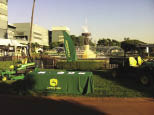
Take advantage of equine market promotions your manufacturer offers. John Deere and the National Thoroughbred Racing Assn. partner to offer a discount program and exhibit here at the Santa Anita Track in California.
“They sometimes think they need a backhoe. I tell them that unless you are using a backhoe all the time, don’t buy it. What hurts you in the long run with the specialty item is that it devalues quickly,” says Tabor. This can lead to an unhappy customer.
Huber says he sometimes even advises against a tractor.
“It used to be that you needed a tractor to pull a manure spreader,” says Huber. For smaller operations, he advises adding a hitch to the zero-turn mower and pulling a ground-driven manure spreader.
Develop the Relationship
A good first step toward connecting with horse owners is associating with horses in big and small ways. Jacobi Sales, for instance, has a life-size statue of a horse in front of their store to show they understand horse owners. Other dealers participate in Cooperative Extension field days or horse association events.
Rivera’s Machinery/Hill Country Tractor sponsors the George Strait Team Roping Classic. The dealership provides prize money, equipment to maintain the area, and partners with Kioti to display equipment at the event. Rivera says it’s hard to measure a direct benefit, but knows the sponsorship helps build their reputation.
Dealer Takeaways
- Recommend equipment that can save them time on major tasks, such as mowing and manure handling.
- Take advantage of manufacturer promotions for the equine market.
- Watch for overbuying by horse owners. This will often lead to an unhappy customer later.
“Coupling Rivera’s Machinery and Hill Country Tractor together with George Strait carries a lot of weight,” he says.
Promotions to Finalize the Sale
Don’t forget to take advantage of your manufacturer equine promotions.
Susan Parks’ job at the National Thoroughbred Racing Assn. is to promote the Equine Savings program to the equine industry and educate dealers on discounts.
“Ask everyone, ‘Do you have a horse? Are you in the equine industry? Are you part of any association?’ ” says Parks.
Andersen of Equine Savings says dealers also need to reflect the passion of their customers.
“When you get excited about it, that’s where the real success starts."




Post a comment
Report Abusive Comment